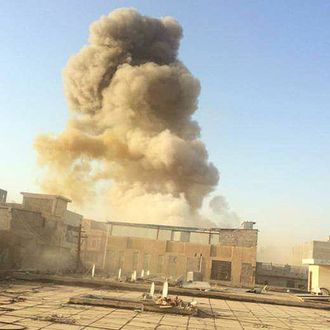
ISIS took control of Ramadi, an Iraqi city 70 miles west of Baghdad, yesterday, which left more than 500 people dead and raised many questions about the future of the region. “There is no denying that this is indeed a setback,” White House spokesman Eric Schultz said on Monday. “But there is also no denying we will help the Iraqis take back Ramadi.” Schultz went on to say that the White House believes “Iraqi forces have the capacity to ultimately take Ramadi with coalition support.”
The Pentagon used similar language to the White House in describing the situation. Spokesperson Colonel Steve Warren said, according to Stars and Stripes, that ISIS “is obviously not on the defensive in Ramadi. That is fairly clear. This is a difficult complex bloody fight and there is going to be victories and there are going to be setbacks and this is a setback.”
The takeover was the biggest ISIS victory since the U.S. began air strikes in the region last year; many will probably question whether the loss is a sign that air strikes will not be enough to deter militants. This weekend, the coalition forces carried out at least 19 air strikes in the region since Sunday morning — more than have ever been carried out in one location in either Iraq or Syria.
The situation looks the same in Iraq. Tribal leader Sheikh Rafi al-Fahdawi told the New York Times, “Men, women, kids and fighters’ bodies are scattered on the ground. All security forces and tribal leaders have either retreated or been killed in battle. It is a big loss.”
ISIS now controls more than 60 percent of Anbar, according to the Associated Press.
Air strikes are reportedly ongoing, and the Iraqi prime minister is sending reinforcements to the region — including about 3,000 Shiite militia members that the U.S. has been wary of getting involved given their connection with Iran. Secretary of State John Kerry, predicting what would happen next in Iraq at a news conference today, said, “It is possible to see the kind of attack we have in Ramadi, but I am absolutely confident in the days ahead that will be reversed.”
Others are afraid what ISIS’s presence in Ramadi might mean for those who live there. Muhannad Haimour, spokesman for the governor of Anbar, told CNN that around 8,000 people had left the city this weekend, and that leaders are “extremely concerned about massacres that we think will be committed by ISIS … We are witnessing a humanitarian crisis.”
Outside of Ramadi, there are worries about what the loss may mean for Prime Minister Haider al-Abadi’s ability to govern the country; his rivals have used the omnipresent problems of ISIS to complicate his plans to ease tensions between different groups in the country. Al-Abadi had said in April that coalition forces were on the offensive in Anbar and promised that Ramadi would not fall.





























